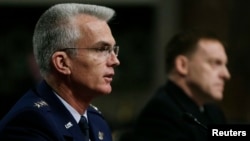CAPITOL HILL —
U.S. lawmakers on Tuesday reiterated their concerns about the nation’s intelligence gathering activities exposed by a fugitive former contractor at the National Intelligence Agency (NSA), Edward Snowden. At a confirmation hearing on Capitol Hill, senators sought answers from President Barack Obama’s nominee to head the NSA, who promised to rebuild trust through dialogue with the American people.
Recent months have brought unprecedented scrutiny and public shaming of the NSA, whose reach into the lives of Americans and foreigners alike has been revealed in successive waves of explosive revelations from Snowden.
And the man tapped to lead the agency out of the current morass, Navy Vice Admiral Michael Rogers, sat through more than two hours of questioning during Tuesday's Senate confirmation hearing. Republican Ted Cruz blasted the NSA's focus on bulk data collection.
“The government collecting metadata or, even more so, the content between law-abiding citizens is an issue that I believe the [U.S.] Constitution speaks very directly to," Cruz said. "It would be a far better allocation of resources in the NSA if much more resources were directed to targeting those who we have reason to know are dangerous, we have reason to know are or may be radical Islamic terrorists.”
That sentiment was echoed by Democratic Senator Mark Udall.
“The Constitution is not an impediment to our security." he said. "It is the source of our security. We can end bulk [data] collection and focus on terrorists and spies without infringing on the constitutional rights of law-abiding Americans.”
Admiral Rogers said data collection is a necessary tool to keep America safe, but acknowledged that trust must be rebuilt between the nation’s intelligence apparatus and its people.
“One of my challenges as the [NSA] director, if confirmed, is how do we engage the American people, and by extension their representatives, in a dialogue in which they have a level of comfort as to what we are doing and why," he said, adding, "It is no insignificant challenge.”
One senator, Democrat Tim Kaine, said Congress is not without blame, noting that lawmakers authorized an open-ended war on terrorism after the attacks of September 11, 2001. He said Congress is only now beginning to assert its authority and set limitations in the conduct of that war that should have been established from the start.
Earlier this week, Snowden expressed no regrets about his actions. Speaking from Russia via videocast to a technology conference in Texas, Snowden said that the government and the public have benefited from the information he revealed.
If confirmed by the Senate, Admiral Rogers would succeed outgoing NSA Director Keith Alexander, who assumed the post during former president George W. Bush’s second term.
Recent months have brought unprecedented scrutiny and public shaming of the NSA, whose reach into the lives of Americans and foreigners alike has been revealed in successive waves of explosive revelations from Snowden.
And the man tapped to lead the agency out of the current morass, Navy Vice Admiral Michael Rogers, sat through more than two hours of questioning during Tuesday's Senate confirmation hearing. Republican Ted Cruz blasted the NSA's focus on bulk data collection.
“The government collecting metadata or, even more so, the content between law-abiding citizens is an issue that I believe the [U.S.] Constitution speaks very directly to," Cruz said. "It would be a far better allocation of resources in the NSA if much more resources were directed to targeting those who we have reason to know are dangerous, we have reason to know are or may be radical Islamic terrorists.”
That sentiment was echoed by Democratic Senator Mark Udall.
“The Constitution is not an impediment to our security." he said. "It is the source of our security. We can end bulk [data] collection and focus on terrorists and spies without infringing on the constitutional rights of law-abiding Americans.”
Admiral Rogers said data collection is a necessary tool to keep America safe, but acknowledged that trust must be rebuilt between the nation’s intelligence apparatus and its people.
“One of my challenges as the [NSA] director, if confirmed, is how do we engage the American people, and by extension their representatives, in a dialogue in which they have a level of comfort as to what we are doing and why," he said, adding, "It is no insignificant challenge.”
One senator, Democrat Tim Kaine, said Congress is not without blame, noting that lawmakers authorized an open-ended war on terrorism after the attacks of September 11, 2001. He said Congress is only now beginning to assert its authority and set limitations in the conduct of that war that should have been established from the start.
Earlier this week, Snowden expressed no regrets about his actions. Speaking from Russia via videocast to a technology conference in Texas, Snowden said that the government and the public have benefited from the information he revealed.
If confirmed by the Senate, Admiral Rogers would succeed outgoing NSA Director Keith Alexander, who assumed the post during former president George W. Bush’s second term.




